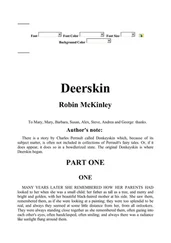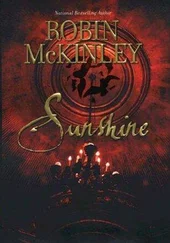“Ascur, not knowing what else to do, went to his son, and attempted to lift him, but his own wounds prevented him; and he said, ‘We must get away from here; there is nothing you can do for Erex.’ Tilbad rose to his feet, but his gaze was turned inward, and it was as though he did not see that his own father stood before him sore injured. He said, ‘I will die of this wound, Father,’ though there was no mark on him.
“And so it was, for Tilbad died twenty-three months later, having lived long enough to be a part of the driving of the remaining rocs and their allies out of his father’s kingdom, for as if upon the death of Erex, the human army rallied; it grew stronger and fiercer than anyone who had stood with Ascur that day and watched Tilbad kill a roc would have believed possible. Tilbad saw peace re-established, and the farmers growing a new year’s crops untroubled in their old fields, and the stock fattening, and children playing in the meadows.
“It was said of Tilbad that from the moment of Erex’s death he never smiled, nor spoke any word that was not absolutely necessary; and that he fought tirelessly, and took risks no sane man would take—and lived; which is as some men do, from a grief too great for them to bear. And when Tilbad had seen that his father’s land—his own land—our sweet green land—was safe again, he disappeared. But when the news had come to the king that Tilbad could not be found, the king blanched, saying nothing, but rose from his chair and went at once to Erex’s grave. Few pegasi are buried within the palace Wall, but Tilbad had begged this favour of both his father and Erex’s, and so she had been buried in a little private glade some distance from the palace, in a place no one would notice or go, unless they wished to visit her grave. And there Tilbad’s breathless body was found, curled up on its side, head resting near the head of the grave. And there was no mark on him.”
Sylvi was paralysed. She could feel her mouth fallen a little open, feel her body bent a little forward and resting its weight on her two clenched hands on the chair-arms, her elbows bent up and behind her like rudimentary wings. In her mind a tiny voice said, And what wound was it Tilbad died of? The loss of his friend or the lie the roc told? Rocs speak the truth when they are dying, her conscience answered miserably; it is in the histories. They speak the truth when they are dying, and they live almost forever—if that roc hadn’t been killed, it might be one of those facing us now; those we face might remember it, and remember its death. But the tiny wild voice replied, Who says they tell the truth? And what truth do they not tell?
Ebon still stood like a stone pegasus.
The bearer moved very slightly again, causing the faintest hush sound of his robe against the sigil-stamped fabric, or of the fabric against whatever it protected.
The smell of blood and death was overwhelming.
Since she had never heard such a thing before, Sylvi did not at first recognise the sound of her father shouting for silence over the tumult in the Little Hall. That there was tumult around her did not register with her at all, the tumult in her mind and heart was so much greater—the tumult inside her, and Ebon’s silence. Why was he not saying what she wished to say—that Fthoom was a liar, that this story was a fabrication created of Fthoom’s overwhelming greed for power, a power potentially threatened by her and Ebon, by the flood of eager suggestions Iridin was putting into order. Ebon’s silence and stillness was as if a part of her were missing; as if a leg or an arm, hitherto faithful, had simply ceased to answer her wishes. And with that she realised for the first time how much a part not just of her life but of herself he was.
And in that same moment she realised that she would lose him.
Again she heard the ghostly cry of a roc, but this time she knew it was a cry of triumph.
Her father was on his feet, shouting. The king never had to raise his voice to be heard; he was the king, and his subjects listened. But many people were shouting: Fthoom, and the magicians with him—and Fazuur was at the front of the dais, on his knees, shouting at them—and some of the courtiers, as well as the king. Most of the ministers, the senators and the blood looked dazed, but Senator Barnum was waving his arms and shouting too.... Sylvi found that she had also come to her feet as if the noise were a sea that threatened to drown her, and she was straining to hold her head above water. Someone’s hands were holding her up, grasping her upper arms, and she knew without looking that the hands belonged to Glarfin, and she leaned into them as she struggled for some—any—clarity of mind.
She turned her head and that link at least was still there, for Ebon moved at last, and turned his head at the same moment as she turned hers, and they stared into each other’s eyes, each reading shock and love and despair in the other’s.
Sylvi—
Ebon—
We’ll never forget—
They’re wrong—wrong—
We are bound—
That is the true thing—
Never forget—you are my heart’s—
And then a sound like the end of the world broke in even on their silent speech, for Lrrianay was standing on his hind legs and trumpeting a great belling cry: This was little like his shout four years ago, nor yet that of his son a few months ago. This was a war-cry, the sound of someone who goes into battle knowing already that the battle is lost, but knowing it must be fought, even if he dies of it. Sylvi said, Oh, Lrrianay, you are also my father, and Aliaalia is my mother, and Niahi is my sister . . . but she doubted he heard her.
No one had ever heard such a noise indoors before; pegasus bodies, with their hollow bones and vast airways are more resonant sounding-boards than most musical instruments, and Lrrianay was angry. He spread his great wings, and footmen and ministers scrambled out of the way, and the draft of just that first sweep open blew Sylvi’s hair back. Again she smelt the Rhiandomeer smell of earth and flowers, and this time it smelled like good-bye.
Those who knew no word of the pegasi language could nonetheless hear what he was saying, with his ears flat back like an angry horse’s but his eyes much brighter and fiercer and more intelligent than any horse: Quiet! Quiet! There will be order in this place! I say so, Lrrianay, king of the pegasi!
Sylvi, even in her desolation, saw Fthoom, who had come so far forward that he was leaning over the edge of the dais with the lustre of triumph rising off him like a stench, step back and fall silent.
Quiet fell quickly, and Lrrianay dropped back to four legs and drew his wings together again, though they would not settle, and his feather-hands were spread like fans. He might have knocked half the people off the dais, had he been even a little careless, but he had reared immediately behind his bondmate, and so briefly Corone had been haloed as if he too had wings. There was a little fox-fire glint on many pegasus wings, but it was very strong now on Lrrianay, and tiny kinked rainbows ran dizzyingly from his shoulders.
Fleetingly he put his nose to Corone’s temple as if returning a mandate briefly borrowed—and Sylvi registered that Lrrianay actually touched him, as she felt Ebon’s velvet nose briefly touching her own cheek. Corone’s face was cold and angry, and Sylvi was so confused and unhappy that she wondered if perhaps he was angry at her and Ebon. If it were not for them, none of this would be happening . . . and perhaps . . . No, no, Fthoom was lying!
The room was now as unnaturally silent as it had been unnaturally noisy a moment before; the young bearer seemed to have stopped breathing. Corone spoke quietly, but everyone present heard every word. “This is a great matter that has been set before us, and the king must respond to it at once. The king’s daughter and Lrrianay’s son shall be kept apart from this moment, until those who may understand such affairs have looked into this one with the care and caution vital in a situation which may bear upon the future of the entire country. If what Fthoom has revealed to us today is as simple as it appears, he has done us a very great service.”
Читать дальше












